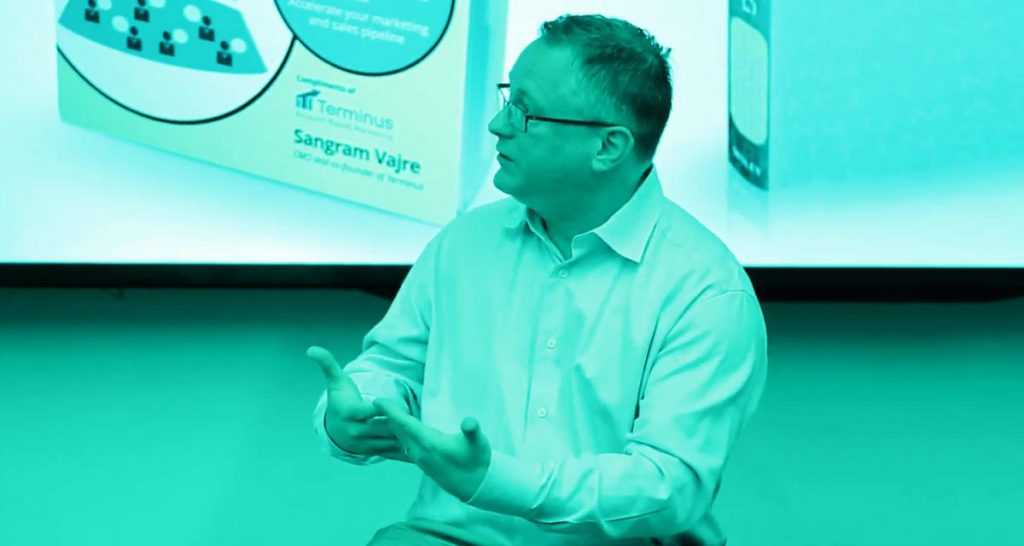Account based marketing (ABM) is one of the many new buzzwords in the marketing world. Just a few weeks ago, our very own ion CTO and co-founder Scott Brinker along with Terminus CMO and co-founder Sangram Vajre met to talk about how ABM is affecting the ever changing marketing world. They discussed how ABM is revolutionizing the marketing sphere and ways to practice ABM successfully. If you want to learn more, make sure to check out the full video of their discussion below!
Well welcome everybody to today’s MarTech CMO breakfast, thank you for joining us. My name is Jeff Perkins, I am the CMO of QASymphony, we’re a software testing company here in Atlanta. And we’re very lucky today to have two special guests. Everybody knows, the man, Sangram Vajre. Sangram is the CMO here of Terminus, also co-founder, formerly one of the leading marketers at Pardot, and Sangram’s also now a best-selling author. So, very excited to have Sangram here.
Our guest from out of town is, the man, Scott Brinker. Scott is the co-founder and CTO of ion Interactive. Many also know Scott as the leading mind of marketing technology. Of course, everyone should follow Scott at @chiefmartech on Twitter, and @sangramvajre on Twitter, for you.
So let’s start with you, Scott. Tell us about why you wrote a book, the process for writing the book, and how you feel now that the book is out and published?
Scott:
Wow, okay. So, the last question first: relieved. So Hacking Marketing. As you mentioned, my blog chiefmartech.com, for about eight years, I’ve really been look at the intersection of marketing and technology. And, what’s always been exciting to me is not so much the technology itself, although lots of cool technology, particularly in the ABM space these days, right? But really how, as technology has infiltrated marking, this actually is changing the sorts of activities that marketing does, it’s changing the way we think about managing marketing, the culture of marketing. What seems to be happening is, as more and more software invades marketing, marketing is starting to take on more and more of the characteristics of managing a software environment. Which is kind of odd, because most marketers did not start out life thinking, oh yeah, it’s a toss up for me between software development and marketing. But today, a lot of the activities that marketers do have these dynamics of software development. So I wrote Hacking Marketing to basically give marketers an introduction to management concepts and frameworks from the software world, that I think are now very relevant to what they’re trying to do in marketing.
Jeff:
It’s so interesting, Gartner is quoted as saying, I think in 2020 marketing departments will actually outspend IT departments on technology. So, talk a little bit about the skillset of this new breed of the marketing technologist. Because like you said, it’s not a traditional brand marketer, it’s someone who has to be able to work between software development, and the marketing world. I mean, what kind of person fits in that role?
Scott:
It’s a great question. First, let me disclaim, I don’t believe everyone in marketing needs to be a technologist, just like not everyone in marketing needs to be a great graphic designer or great copywriter. You are still very much looking at a team that is trying to leverage different strengths, it’s just now a lot of these technology talents and skills have to be a part of that team as well. So, I classically always expected that the people who would be great for these roles are the people who come from a software background, a web development background, in some cases even an IT background, who have that technology experience, and typically an engineering degree or something like that. But they get very passionate about the application of those skills, in marketing. And as marketing has evolved from being more than what classically was thought of as, oh, well they’re the one who do the ads, to something where now marketing really is the champion of these customer experiences, and these digital touch points. It’s actually very exciting work for a lot of people who have that software background.
So that’s to me the classic vision of a marketing technologist. But as I’ve been running the MarTech conference for a few years here now, I’m amazed, I would say almost half of the attendees come from the other direction. That their background is in marketing, but they just get fascinated by these technologies, and they dive in, and they self-teach themselves. I think marketing technologists can come from either side.
Jeff:
Great. So Sangram, you also have a new book, Account Based Marketing for Dummies. So, how’d you come up with that title?
Sangram:
I did come up with the account based marketing, the other one was given to it. But I feel like, in the whole process, I realized I am the dummy. Because it’s a fascinating concept, it’s coming up in many different ways. It’s been there for a long period of time, I think sales has always been doing account based selling in B2B, but it has never had it’s lights on it for people to realize that this is super important. And, through the process I realized that there are a lot more people, way smarter than me, actually know a whole lot more. The book was just, almost a way to talk to fifty plus influences in the whole marketing technology, and sales, and customer advocacy and all the spaces and say, you know what? What is the best way to do this part of the whole flip funnel, as I like to think about it. The book was just the result of all that. So, it really helped to put a book that has never been talked about, the topic that has been there for years, but hasn’t really talked about in terms of how marketing can take of it, or sales, or customer success, and account based marketing for B2B seems like the must have. So it’s great to write a book on it.
Jeff:
So what do you have to do to get people’s attention, and really to break through the MarTech clutter?
Sangram:
Flip funnels. I think that really been the way to do it. I think there is definitely a lot of noise. And, I think the marketing … Just a little bit of story, to kind of have some context here. I think every five years there’s some evolution in marketing, and I’d love to get your thoughts on it. I feel like 2000 was the year where e-mail came in, and everybody was like, I can spam people? That’s freaking awesome. So e-mail really started to get out there, and people really started to push a ton of e-mails out. And then, in 2005 people started to realize that, wait a minute, we’re sending all these e-mails in order to capture these leads, from some way. So marketing automation came to life. And with marketing automation and e-mail and content marketing, fast-forward five years, in 2010, that’s when predictive came to life. Because at that point, where everybody was like, wait a minute, I’m getting too many leads, but I don’t know which leads to focus on. And now predictive was like, now let a minute, I can help you with that. So predictive was born. And in five years, fast-forward again 2015, now you got account based marketing. Which is like, all right in last fifteen years, I still hasn’t changed how I market, because I’m still e-mailing everyone. That hasn’t changed.
The technology has changed, the way people are sending content, or putting content out there has changed, but the communication channels hasn’t really changed, hasn’t really progressed. I think account based marketing is at the point where, you’re really trying to tackle multiple different things. One is, you got so many more people in the buying process, how do get my message in front of all of them? And most people just don’t do it when it comes to lead based marketing. And the second part is, how do I engage people on their terms? That’s where, I think how do you break through the noise. I think account based marketing is just the answer to people crying out there, saying hey we need a way to consolidate these things, and I want to figure out. For a company like ours, as a startup, what we started to do was bring in almost all players in the whole ABM space, and say let’s just put events together, let’s just create content together, and let’s just kind of, rising tide, lift our boats idea, and started this conference called Flip My Funnel, really to bring the right kind of people together, and it really has been the best thing we have ever done.
We have no idea how many leads we get, we have no idea how many e-mails we send, but it’s more about how many accounts are we engaging in, are these right accounts we want to go after. And that has fundamentally changed the way we look at sales and marketing.
Jeff:
How do you view ABM in the context of the MarTech world?
Scott:
That’s a great question, because to me, one of the things, I mean, there’s two things happening here with ABM. There’s certainly a set of technologies, Terminus is one, that really were designed from the ground up to really take advantage of this new capability. But as you’ve seen with Flip my Funnel, as much of this isn’t a technology play, it is sort of an organizational shift in thinking. And to me, I think that’s one of the reasons you have this challenge now of, every company on the MarTech landscape raises their hand and says, we do account based marketing too. And in some way, that’s true because if you look at it as an organizational change in how you’re approaching the collaboration of sales and marketing to win business, basically everything you start doing you begin aligning through that account based lens. But I think it is particularly exciting to say, well a lot of these technologies, they weren’t originally architected with that world in mind, and so some of them you have to squeeze and fiddle a little bit harder than others. And I think this new generation that you see, that really was designed with these objectives in mind from the start are helping to push the practice foreword, so it’s very exciting.
Jeff:
And what should every marketer that’s here, that’s watching this video be checking out now? Maybe not buying, but checking out, and be very familiar with, because you think it might be the next big thing in marketing technology?
Scott:
Ironically, I’m sort of technology agnostic. To me, it is the more exciting thing are actually those challenges of, okay how do you pick the right technologies to really have a particular company break through.
So that’s a bit of a dodge, but I will say there is an area in the marketing technology space that is fascinating. I think if you talk about these waves of five year waves, if I were to take a guess what the next wave will be five years from now, I think the state of where things are going with artificial intelligence and machine learning have hit a tipping point, where they’re starting to be able to take on missions that people never imagined a computer were doing. Things actually around generating creative, the right creative, optimizing it. And in some ways, I mean this is very exciting, to the degree this actually happens it will thoroughly disrupt marketing far more than anything else we’ve ever seen before.
That’s frightening. But, the good thing coming out of that, is the problem you said earlier in your question of, how do you deal with all these technologies? Okay great, the technology is now figured out, I have, not two segments, but I have fifty segments, how do I craft different messages and campaigns? It is not humanly possible to take advantage of what all the of the technology now makes possible. And I think to the degree that we’re able to see machine learning and artificial intelligence, even if it’s simply an assist to marketers. And marketers retained for at least, hopefully a while right? That human control over the very top of it, that it will augment marketing’s ability to operate at the scale that the rest of the technology makes possible. So hopefully this craziness that we’re wrestling with right now, where our responsibilities seem to just get bigger and bigger and bigger every month, hopefully something will start to give us a hand in getting through that.
Jeff:
Sangram, why don’t you prognosticate as well. What do you see out there in the MarTech landscape, as a practitioner and as someone who sells marketing technology. What do you see beyond you category and maybe that-
Sangram:
Beyond my category?
Scott:
That is ABM. What else is there?
Jeff:
You’re category is very exciting.
Sangram:
I think this is the end of the road. This is Terminus right? This is it. I’ll go back the same part as, I think I’ll almost take the opposite viewpoint than what Scott is taking here, with all due respect. There is too much technology, and I think what’s going to happen is, we’re going to find not more technology, but actually the rise of product marketing in marketing technology, in the whole space. Because that’s the most thankless group of all marketing. Nobody talks about them, right? There’s talk about marketing technologists, you talk about graphic designers, writers and stuff. Nobody really talks about product marketing. And you think about what the role or job of them is, the art of, again, storytelling things, right? I feel like, there’s going to be more and more technology yes, but where I think real disruption is going to happen, is the way the communication is going to start happening. And I think there’s going to be a big rise of saying that well, we don’t need the technology, what we have is enough.
What we need is a lot more of how we get this message out, how to we break through the noise, and for that technology’s going to add more noise, as opposed to humans I think have to kind of rise again, in some ways. And really kind of figure out how are you going to make the right message go out there in the right context. And the context is going to be really, really important. So I feel like there is going to be more technology for sure, but there is going to be a rise of more real marketing. I think most marketers like me are kind of hacked into it, this happened to be there. But then real marketers are going to come back from the Mad Men era, and really start thinking and looking at things in a different way, and that’s going to be really, really exciting.







